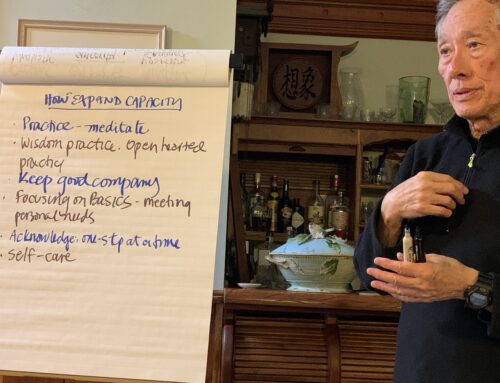I am large, I contain multitudes.
—Walt Whitman

Image by John Hain
When somebody asks you who you are, how do you respond? Naturally, you start with your name. Then do you tell them your age, your gender, your job? Do you tell them about your kids or your family? Do you tell them about your hobbies? Maybe you tell them about your friends or your political affiliations. You might mention which sports you’re into, or your favorite kinds of entertainment.
Notice something about all these things? None of them define you. They all define things you relate to. Even your name, age, and gender are things you relate to. Your name was given to you (and even if you chose it, is it you?), your age is never a constant and, like it or not, we’ve all become more aware how fluid gender can be.
Are you your body? That is fluid too. The body you see in the mirror today is not the same as the one you see in photos from the past.
In fact, nothing is constant about this idea of you. Yet the idea of you is your identity. It’s the thing most of us base much of our existence on, and yet it’s something that is impossible to grasp. And speaking of fluid, have you noticed how your identity changes from interaction to interaction? How the you who attends church is different from the you who goes to the bar or the you who lives with your family? How the you speaking to a police officer is quite different from the you speaking to a child? Or how the you on their own is rarely the same as the you among friends?
Yet when asked who we are, we typically say, I am [name], I am [age], I am a [job], and I am a [family role]. Are you? Surely, in that moment, the only thing you are is a person attempting to answer a question that can’t be answered authentically.
And if you really want to get down to it, are you even a person? On the surface this sounds ridiculous, but what defines you as a person? Your body? Your age? Your gender? Your DNA? Even the idea of person is fluid, as Charles Darwin essentially concluded through the concept of evolution. Like our bodies and our minds and our lives, it too is constantly evolving—just on a timescale that isn’t immediately evident from a generational perspective.
There is literally nothing you can hold onto that belongs in a sentence that starts with I am…
So what can you hold onto? Well, what say I answer that question with another one: what do you want to hold onto? What’s most important to you? Your family? God? Your sanity? Most parents will tell you of the pain of seeing their children grow older and further apart, and anyone who has lost someone close to them will share how unbearable that can be. If God exists, what exactly is He, and could you possibly comprehend it? Whatever you see will be limited by your understanding, so that you see Him in your image and not as He truly is. As for your sanity, that’s as mutable as the waves at a beach—holding onto that will drive you crazy!
Which is not to say don’t love your family or God or your sanity from the depths of your being. It’s just to say, don’t hold on too tight—as that’s a surefire recipe for suffering.
Instead, perhaps, get real still and experience what lies beyond your thoughts and concepts. When you drop every thought, every concept, every plan, memory, and idea, something still remains. See if you can go there for a few moments. What are its qualities? Does it have a name, age, or gender? An identity of any sort? A shape? Where does it begin and where does it end? Does it ever change?
Perhaps this space is you, and your identity is a story. Perhaps we are never what we think we are. And perhaps our authentic self is the one we find when we get out of our own way.
Who are you? It’s so hard to say when you contain multitudes.




Nice one Jamie, that question is really mind-boggling if you let yourself go there
Nice piece of writing Jamie! Thanks!
Tea at the Palaz of Hoon
Wallace Stevens
Not less because in purple I descended
The western day through what you called
The loneliest air, not less was I myself.
What was the ointment sprinkled on my beard?
What were the hymns that buzzed beside my ears?
What was the sea whose tide swept through me there?
Out of my mind the golden ointment rained,
And my ears made the blowing hymns they heard.
I was myself the compass of that sea:
I was the world in which I walked, and what I saw
Or heard or felt came not but from myself;
And there I found myself more truly and more strange.
Harold Bloom, in commenting on this poem, refers to these lines from another Stevens poem;
In the far South the sun of autumn is passing
Like Walt Whitman walking along a ruddy shore.
He is singing and chanting the things that are part of him,
The worlds that were and will be, death and day.
Nothing is final, he chants. No man shall see the end.
His beard is of fire and his staff is a leaping flame.
And then,
“Whitman, like Hoon,” writes Bloom, “both contains everything else and is an idea of the sun, not as a god but as a god might be. Hoon is himself the compass of the sea whose tides sweep through him; Walt encompasses worlds but himself is not to be encompassed.”
Jamie, in your post you write, “Who are you? It’s so hard to say when you contain multitudes”.
🤔
All this brings to mind something once said by the great Satchel Paige,
“How old would you be if you didn’t know how old you are?”